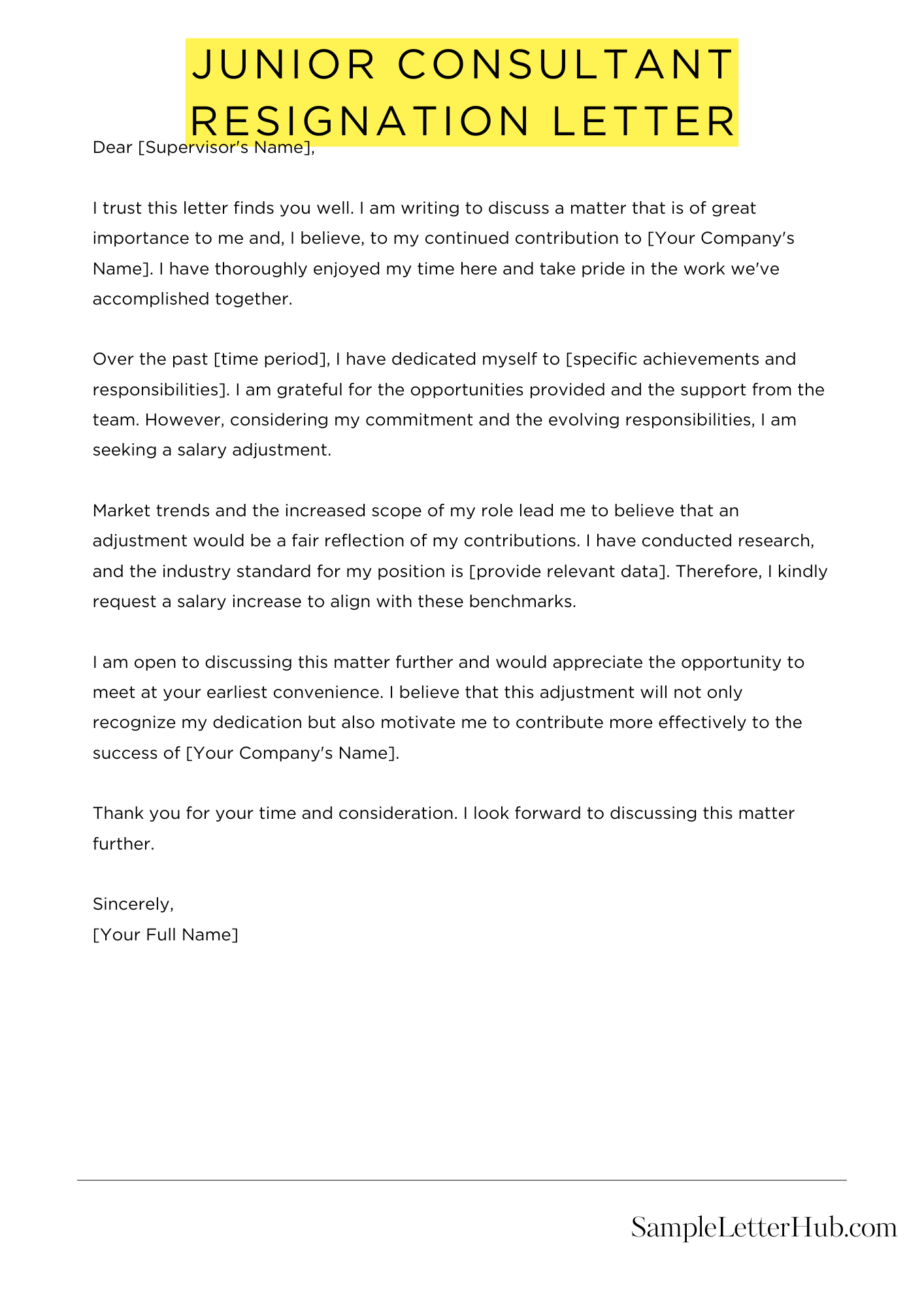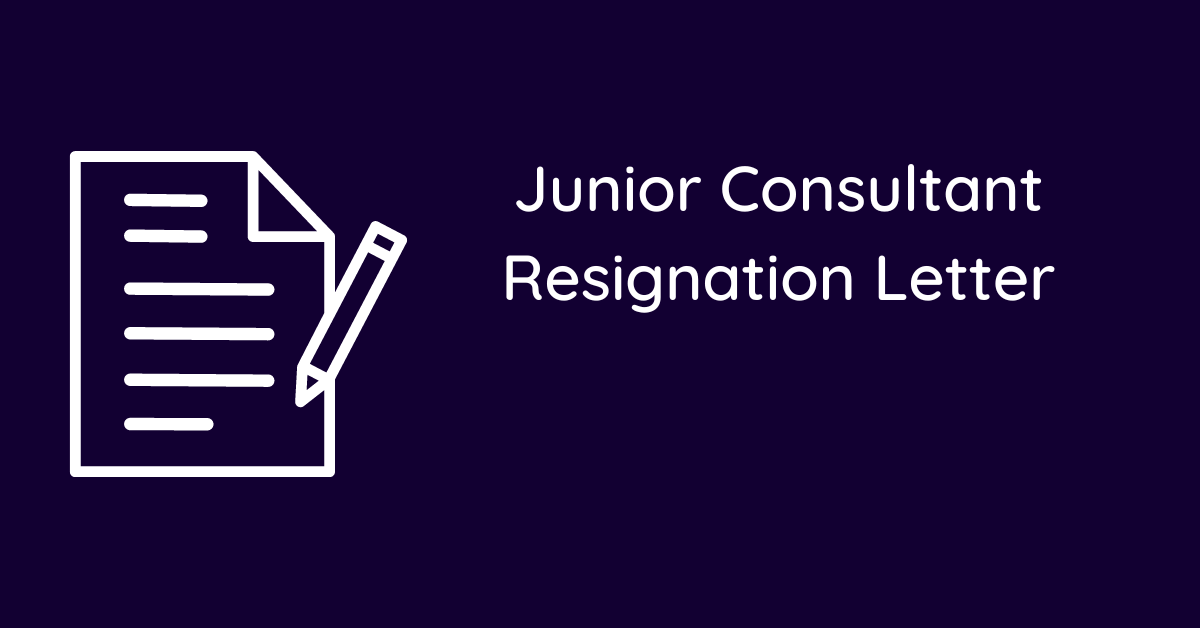Leaving a job can be a daunting task, but writing a clear and professional resignation letter is a great way to make the transition as smooth as possible. In this article, we’ll share an example of a junior consultant resignation letter that you can use as inspiration for your own.
When writing your resignation letter, it’s important to be polite and humble. Thank your employer for the opportunity to work at the company and express your appreciation for their support. Be clear about your decision to leave and state your last date of employment. You don’t need to go into detail about your reasons for leaving, but you can briefly mention your plans for the future if you’re comfortable doing so.
Below, we’ve included a template for a junior consultant resignation letter that you can use as a starting point. Feel free to adapt it to fit your own circumstances and style.
Junior Consultant Resignation Letter
Dear [Manager’s Name],
Please accept this letter as formal notification that I will be resigning from my position as Junior Consultant with [Company Name], effective two weeks from today, [Last Date of Employment].
I want to express my sincere gratitude for the opportunity to work at [Company Name] and for the valuable experience I have gained during my time here. I have learned a great deal and have developed both professionally and personally.
I wish you and [Company Name] all the best in the future.
Sincerely,
[Your Signature]
Short Junior Consultant Resignation Letter Sample
Please accept this letter as formal notification that I am resigning from my position as Junior Consultant at [Company Name]. My last day of employment will be [Your Last Day]. Thank you for the opportunity to grow and learn during my time here. I wish you and the company continued success. I am happy to assist in the transition process to ensure a smooth handover of my responsibilities.
I wish you all the best with your junior consultant resignation letter.
When it’s time to say farewell, expressing your gratitude and best wishes can make the transition smoother:

How to Write a Junior Consultant Resignation Letter
1. Begin with a Professional Salutation
Start your letter with a formal salutation, such as “Dear [Manager’s Name].”
2. Express Your Gratitude
Begin the body of your letter by expressing your gratitude for the opportunity to work as a junior consultant at the company. Mention specific experiences or projects that you enjoyed and learned from.
3. State Your Reason for Leaving
Clearly state your reason for resigning, whether it’s a new job opportunity, a career change, or personal reasons. Be brief and professional, avoiding any negative or critical comments.
4. Offer to Assist with the Transition
Offer to help with the transition during your notice period. This could include training your replacement, completing ongoing projects, or providing documentation.
5. End with a Positive Note
End your letter on a positive note, expressing your appreciation for the company and your colleagues. Wish them well in the future and offer to stay connected.
Junior Consultant Resignation Letter: 6 Frequently Asked Questions and Answers
Resigning from a job can be a nerve-wracking experience, especially for junior consultants who may be new to the professional world. To help ease the process, here are six frequently asked questions and answers about writing a junior consultant resignation letter:
1. What should I include in my resignation letter?
Your resignation letter should include your name, position, the date you’re resigning, and your last day of employment. You should also express your gratitude for the opportunity to work at the company and briefly state your reason for leaving.
2. How should I format my resignation letter?
Your resignation letter should be formal and concise. Use a standard business letter format and keep it to one page. Use clear and concise language, and proofread your letter carefully before submitting it.
3. When should I submit my resignation letter?
It’s generally considered good practice to give your employer at least two weeks’ notice. This gives them time to find a replacement and ensure a smooth transition. However, if you have a particularly close relationship with your employer, you may want to give them more notice.
4. What should I do if I’m feeling nervous about resigning?
It’s normal to feel nervous about resigning, but it’s important to remember that you have the right to leave a job that’s not a good fit for you. If you’re feeling anxious, try practicing what you’re going to say to your employer or writing out your resignation letter in advance.
5. What if my employer asks me to stay?
If your employer asks you to stay, it’s important to be polite but firm. Thank them for their offer, but reiterate your decision to leave. You can also offer to help with the transition in any way you can.
6. What should I do after I submit my resignation letter?
After you submit your resignation letter, it’s important to maintain a positive and professional attitude. Continue to do your job to the best of your ability, and help your employer with the transition in any way you can.
Before making the decision to resign from your job, it’s essential to consider the legal aspects:
Understanding your emotions after quitting your job is important. Explore why you might be feeling sad:
Related
- Resignation letter sample
- Forced resignation letter
- Resignation letter due to going abroad
- Resignation letter due to marriage
- Resignation letter due to other opportunity
- Resignation letter due to mistake

